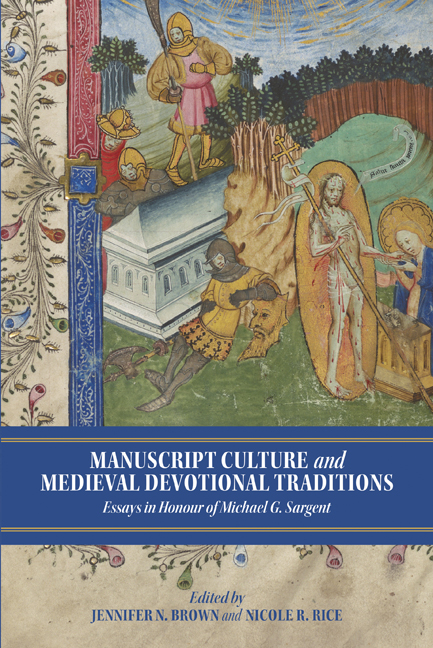Book contents
- Frontmatter
- Dedication
- Contntes
- List of Illustrations
- Acknowledgements
- List of Abbreviations
- Michael Sargent: An Appreciation
- I Manuscript Transmission and Textual Adaptation
- II Translated Texts and Devotional Implications
- III Rhetorical Strategies and Spiritual Transformations
- IV Texts and Contours of Religious Life
- Bibliography
- List of Contributors
- Michael G. Sargent’s Publications
- Index
- Tabula Gratulatoria
- York Manuscript and Early Print Studies
Michael Sargent: An Appreciation
Published online by Cambridge University Press: 24 March 2021
- Frontmatter
- Dedication
- Contntes
- List of Illustrations
- Acknowledgements
- List of Abbreviations
- Michael Sargent: An Appreciation
- I Manuscript Transmission and Textual Adaptation
- II Translated Texts and Devotional Implications
- III Rhetorical Strategies and Spiritual Transformations
- IV Texts and Contours of Religious Life
- Bibliography
- List of Contributors
- Michael G. Sargent’s Publications
- Index
- Tabula Gratulatoria
- York Manuscript and Early Print Studies
Summary
Michael Sargent as textual critic
In their introduction to Probable Truth: Editing Medieval Texts from Britain in the Twenty-First Century, Vincent Gillespie and Anne Hudson note that there has historically been a divide, albeit an artificial one, between the literary critic and the textual editor. They suggest, though, that while critics can redirect or circumvent a problem that the text proposes, editors never can – they must confront head on the problems of the text and find a way to resolve or answer those problems in their product. The work of the critic is largely dependent on the work of the editor, but editorial work can be viewed as ‘drudgery’ and somehow less innovative than literary criticism. Of course, in medieval studies many people are both editors and critics, but this labour can still be seen as distinct, their work categorically divided. In these traditional senses, Michael Sargent is both editor and critic. However, he has from the start resisted this taxonomy and shown that the work of the editor is critical, the work of the critic, editorial.
This combination can be seen throughout Michael's career, but perhaps most clearly at its start – with his dissertation ‘James Grenehalgh as Textual Critic’, the formative article, ‘The Transmission by the English Carthusians of some Late Medieval Spiritual Writings’, and in his two major critical editions, Nicholas Love's The Mirror of the Blessed Life of Jesus Christ and, most recently, Walter Hilton's second book of The Scale of Perfection. There are many notable articles and contributions among Michael's works, but to list and discuss them all would constitute an entire volume in itself (all of his published works can be seen at the end of this volume). These works serve as signposts in his evolution as an editor and critic, pointing to the ways in which he has expanded and influenced the field of medieval devotional and editorial studies.
Michael's 1976 essay for the Journal of Ecclesiastical History, ‘The Transmission by the English Carthusians of some Late Medieval Spiritual Writings’, literally remapped the context for English medieval devotional texts and their transmission. It is one of his most cited essays with good reason, as it lays out the ways in which the Carthusian order deliberately translated and disseminated medieval devotional literature.
- Type
- Chapter
- Information
- Manuscript Culture and Medieval Devotional TraditionsEssays in Honour of Michael G. Sargent, pp. xv - xxviPublisher: Boydell & BrewerPrint publication year: 2021



